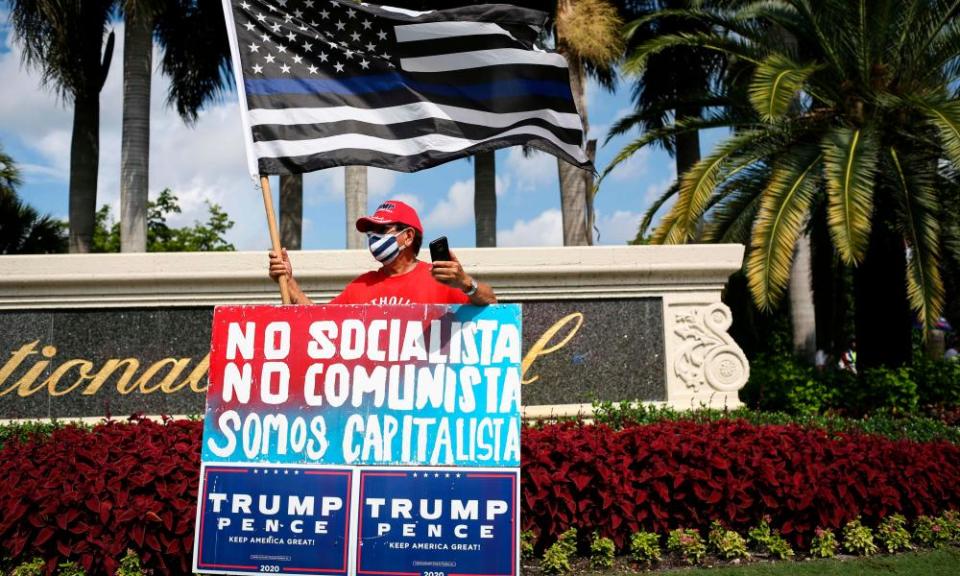US embassy warns Colombian politicians not to get involved in US elections

The American embassy in Bogotá has warned Colombian politicians to “avoid getting involved” in the US election, amid a growing row over allegations that far-right lawmakers from the South American country are campaigning in support of Donald Trump.
At least three senior Colombian politicians have been accused of acting as Trump surrogates in Florida, a pivotal battleground state which has been flooded with political advertising and fake news aimed at Latino voters.
Related: 'Remember us': could Trump lose Florida because of hurricane refugees?
Senators María Fernanda Cabal and Carlos Felipe Mejía, and congressman Juan David Vélez, all members of the hard-right ruling Democratic Centre party, have endorsed Trump and regularly promote him on Twitter.
Francisco Santos, Colombia’s ambassador to the United States, has also been accused by opposition lawmakers of privately coordinating with the Trump campaign. Santos did not respond to requests for comment.
On Monday, the US ambassador, Philip S Goldberg, took the unusual step of issuing a warning to Colombian lawmakers.
“The success of relations between the US and Colombia over many years has been based on bipartisan support,” he tweeted. “I urge all Colombian politicians to avoid getting involved in US elections.”
Colombia’s foreign minister, Claudia Blum, has been summoned to testify on Wednesday before the country’s congress on the brewing scandal.
Florida – with 29 votes in the electoral college – is a key battleground state in the 3 November election, and the Latino vote is seen as critical.
As the race enters its final stretch, the state has been flooded with Spanish-language disinformation, shared on WhatsApp, Facebook and Twitter. Some content portrays Trump’s Democratic opponent, Joe Biden, as a patsy of the hard left, but other articles portray him a successor to Latin American leftist dictators such as Cuba’s Fidel Castro and Venezuela’s Hugo Chávez.
Trump himself has adopted similar arguments. Earlier this month, he tweeted that Biden was “a PUPPET of CASTRO-CHAVISTAS” and claimed “Biden is weak on socialism and will betray Colombia” – a near-verbatim regurgitation of a Democratic Centre talking point.
Joe Biden is a PUPPET of CASTRO-CHAVISTAS like Crazy Bernie, AOC and Castro-lover Karen Bass. Biden is supported by socialist Gustavo Petro, a major LOSER and former M-19 guerrilla leader. Biden is weak on socialism and will betray Colombia. I stand with you!
— Donald J. Trump (@realDonaldTrump) October 10, 2020
The tweet also mentioned Gustavo Petro, a former presidential candidate and mayor of Bogotá who once was a member of the country’s now-defunct M-19 guerrilla group. Although he is probably unknown to most US voters, Petro remains a hate figure for the Colombian right.
In columns published on the Colombian website Periódico Debate and often shared in the US, Cabal has argued that Biden has been led by the “radical socialist wing” of the Democratic party, that coronavirus was “hatched” in China as part of a Marxist plot, and that the Minnesota representative Ilhan Omar is an apologist for “militant Antifa groups fighting in Syria”.
Cabal, who has hobnobbed with prominent Republicans at the past seven Conservative Political Action Conferences (CPAC), said that she is not in direct contact with the Trump campaign.
“Of course I’m campaigning for Trump and have been doing so since he first announced his candidacy, that’s not a crime,” Senator Cabal told the Guardian. “I have the absolute right to campaign for whoever I want.”
Unlike Cabal, Vélez lives in Miami and commutes to Bogotá for congressional sessions. In an interview, he said that as a dual Colombian-American citizen, he is merely exercising his constitutional rights by campaigning for Trump. “But I am not coordinating with the Trump campaign,” he said. Mejía did not respond to a request for comment.
Opposition senator Iván Cepeda has launched a senate investigation into the Democratic Centre politicians’ activities, and argues that they may have infringed US laws prohibiting foreign involvement in its elections.
“There is a line being crossed, and it could be crossing into something that is illegal,” Cepeda said.
Even if their behaviour is legal, Cepeda said, it sets a worrying precedent in a nation that has long been viewed by Washington as key ally in the war on drugs and remains a closer partner in a coalition to dislodge the Venezuelan strongman, Nicolás Maduro.
“This is a break from the bipartisan relations that Colombia has had with the US,” Cepeda said. “This government has broken a basic and fundamental norm, and that could have consequences.”
“Getting involved in another country’s elections is a classic foreign policy faux pas, and needlessly jeopardizes future diplomatic relationships,” said Benjamin Gedan, deputy director of the Latin America program at the Wilson Center, a Washington thinktank. “It is not as bad as covert Russian meddling, but it’s risky.”

 Yahoo News
Yahoo News 